the organisations regarding preferences for honesty
VerifiedAdded on 2022/10/09
|9
|2196
|20
AI Summary
Contribute Materials
Your contribution can guide someone’s learning journey. Share your
documents today.
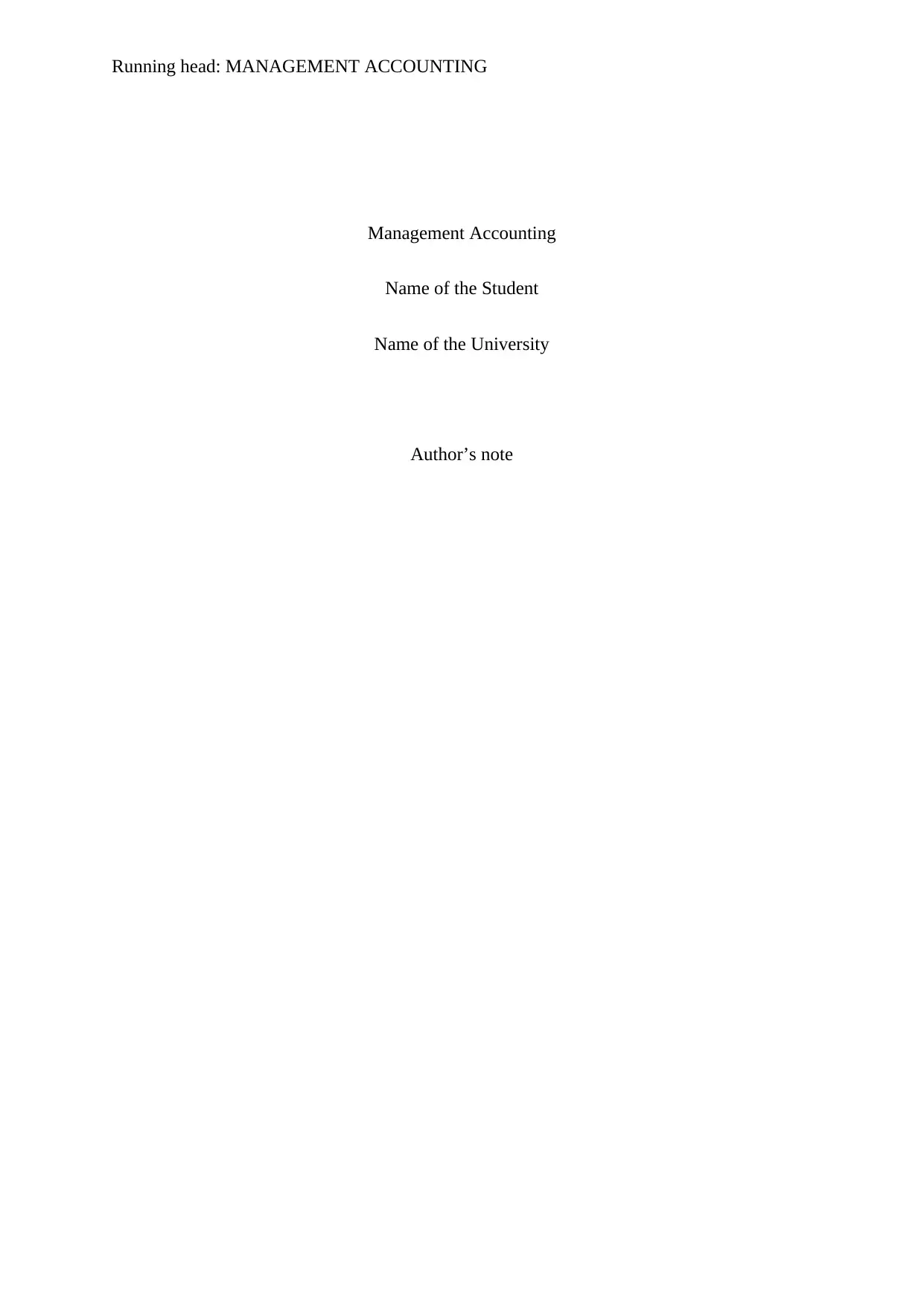
Running head: MANAGEMENT ACCOUNTING
Management Accounting
Name of the Student
Name of the University
Author’s note
Management Accounting
Name of the Student
Name of the University
Author’s note
Secure Best Marks with AI Grader
Need help grading? Try our AI Grader for instant feedback on your assignments.
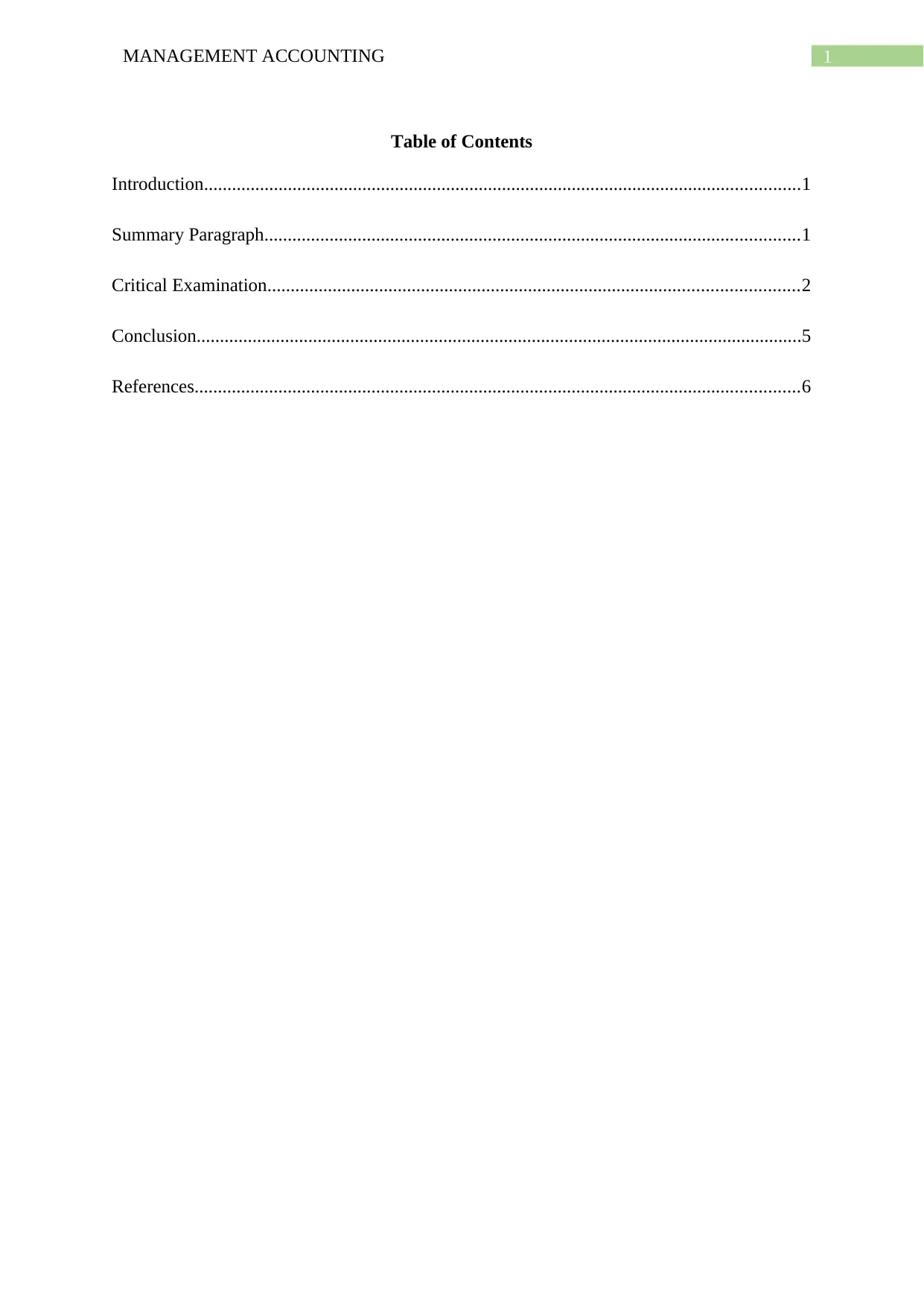
1MANAGEMENT ACCOUNTING
Table of Contents
Introduction................................................................................................................................1
Summary Paragraph...................................................................................................................1
Critical Examination..................................................................................................................2
Conclusion..................................................................................................................................5
References..................................................................................................................................6
Table of Contents
Introduction................................................................................................................................1
Summary Paragraph...................................................................................................................1
Critical Examination..................................................................................................................2
Conclusion..................................................................................................................................5
References..................................................................................................................................6
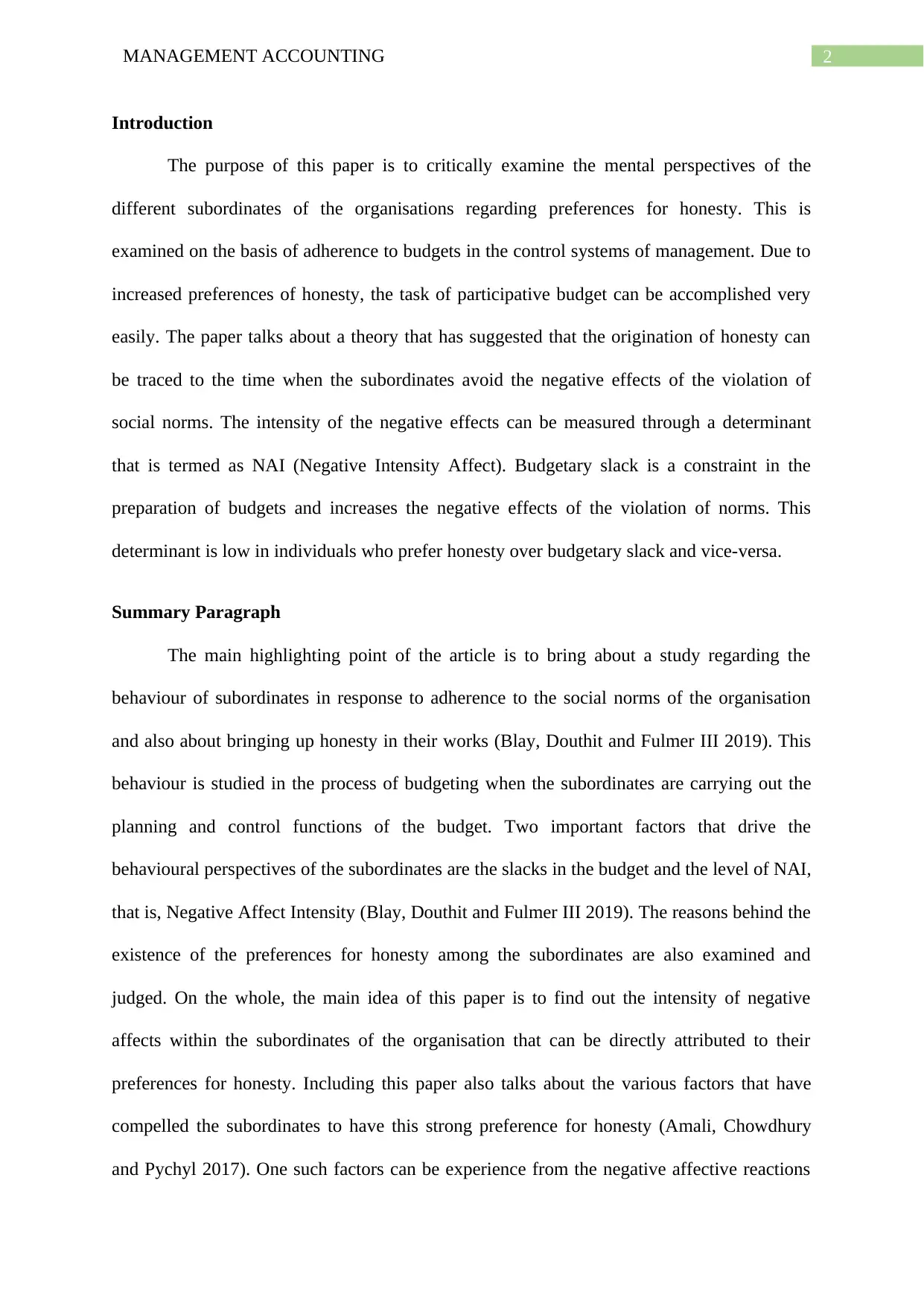
2MANAGEMENT ACCOUNTING
Introduction
The purpose of this paper is to critically examine the mental perspectives of the
different subordinates of the organisations regarding preferences for honesty. This is
examined on the basis of adherence to budgets in the control systems of management. Due to
increased preferences of honesty, the task of participative budget can be accomplished very
easily. The paper talks about a theory that has suggested that the origination of honesty can
be traced to the time when the subordinates avoid the negative effects of the violation of
social norms. The intensity of the negative effects can be measured through a determinant
that is termed as NAI (Negative Intensity Affect). Budgetary slack is a constraint in the
preparation of budgets and increases the negative effects of the violation of norms. This
determinant is low in individuals who prefer honesty over budgetary slack and vice-versa.
Summary Paragraph
The main highlighting point of the article is to bring about a study regarding the
behaviour of subordinates in response to adherence to the social norms of the organisation
and also about bringing up honesty in their works (Blay, Douthit and Fulmer III 2019). This
behaviour is studied in the process of budgeting when the subordinates are carrying out the
planning and control functions of the budget. Two important factors that drive the
behavioural perspectives of the subordinates are the slacks in the budget and the level of NAI,
that is, Negative Affect Intensity (Blay, Douthit and Fulmer III 2019). The reasons behind the
existence of the preferences for honesty among the subordinates are also examined and
judged. On the whole, the main idea of this paper is to find out the intensity of negative
affects within the subordinates of the organisation that can be directly attributed to their
preferences for honesty. Including this paper also talks about the various factors that have
compelled the subordinates to have this strong preference for honesty (Amali, Chowdhury
and Pychyl 2017). One such factors can be experience from the negative affective reactions
Introduction
The purpose of this paper is to critically examine the mental perspectives of the
different subordinates of the organisations regarding preferences for honesty. This is
examined on the basis of adherence to budgets in the control systems of management. Due to
increased preferences of honesty, the task of participative budget can be accomplished very
easily. The paper talks about a theory that has suggested that the origination of honesty can
be traced to the time when the subordinates avoid the negative effects of the violation of
social norms. The intensity of the negative effects can be measured through a determinant
that is termed as NAI (Negative Intensity Affect). Budgetary slack is a constraint in the
preparation of budgets and increases the negative effects of the violation of norms. This
determinant is low in individuals who prefer honesty over budgetary slack and vice-versa.
Summary Paragraph
The main highlighting point of the article is to bring about a study regarding the
behaviour of subordinates in response to adherence to the social norms of the organisation
and also about bringing up honesty in their works (Blay, Douthit and Fulmer III 2019). This
behaviour is studied in the process of budgeting when the subordinates are carrying out the
planning and control functions of the budget. Two important factors that drive the
behavioural perspectives of the subordinates are the slacks in the budget and the level of NAI,
that is, Negative Affect Intensity (Blay, Douthit and Fulmer III 2019). The reasons behind the
existence of the preferences for honesty among the subordinates are also examined and
judged. On the whole, the main idea of this paper is to find out the intensity of negative
affects within the subordinates of the organisation that can be directly attributed to their
preferences for honesty. Including this paper also talks about the various factors that have
compelled the subordinates to have this strong preference for honesty (Amali, Chowdhury
and Pychyl 2017). One such factors can be experience from the negative affective reactions
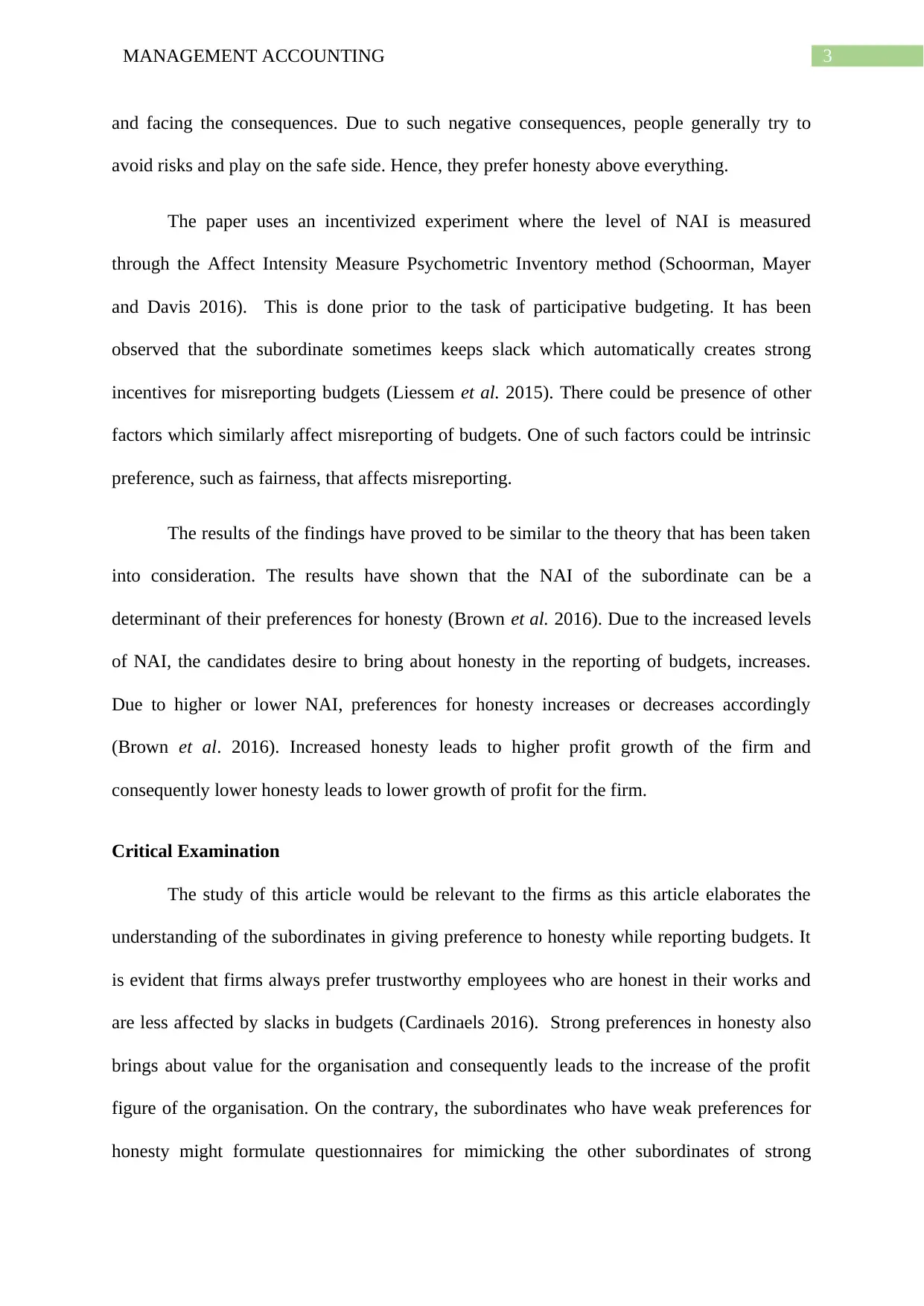
3MANAGEMENT ACCOUNTING
and facing the consequences. Due to such negative consequences, people generally try to
avoid risks and play on the safe side. Hence, they prefer honesty above everything.
The paper uses an incentivized experiment where the level of NAI is measured
through the Affect Intensity Measure Psychometric Inventory method (Schoorman, Mayer
and Davis 2016). This is done prior to the task of participative budgeting. It has been
observed that the subordinate sometimes keeps slack which automatically creates strong
incentives for misreporting budgets (Liessem et al. 2015). There could be presence of other
factors which similarly affect misreporting of budgets. One of such factors could be intrinsic
preference, such as fairness, that affects misreporting.
The results of the findings have proved to be similar to the theory that has been taken
into consideration. The results have shown that the NAI of the subordinate can be a
determinant of their preferences for honesty (Brown et al. 2016). Due to the increased levels
of NAI, the candidates desire to bring about honesty in the reporting of budgets, increases.
Due to higher or lower NAI, preferences for honesty increases or decreases accordingly
(Brown et al. 2016). Increased honesty leads to higher profit growth of the firm and
consequently lower honesty leads to lower growth of profit for the firm.
Critical Examination
The study of this article would be relevant to the firms as this article elaborates the
understanding of the subordinates in giving preference to honesty while reporting budgets. It
is evident that firms always prefer trustworthy employees who are honest in their works and
are less affected by slacks in budgets (Cardinaels 2016). Strong preferences in honesty also
brings about value for the organisation and consequently leads to the increase of the profit
figure of the organisation. On the contrary, the subordinates who have weak preferences for
honesty might formulate questionnaires for mimicking the other subordinates of strong
and facing the consequences. Due to such negative consequences, people generally try to
avoid risks and play on the safe side. Hence, they prefer honesty above everything.
The paper uses an incentivized experiment where the level of NAI is measured
through the Affect Intensity Measure Psychometric Inventory method (Schoorman, Mayer
and Davis 2016). This is done prior to the task of participative budgeting. It has been
observed that the subordinate sometimes keeps slack which automatically creates strong
incentives for misreporting budgets (Liessem et al. 2015). There could be presence of other
factors which similarly affect misreporting of budgets. One of such factors could be intrinsic
preference, such as fairness, that affects misreporting.
The results of the findings have proved to be similar to the theory that has been taken
into consideration. The results have shown that the NAI of the subordinate can be a
determinant of their preferences for honesty (Brown et al. 2016). Due to the increased levels
of NAI, the candidates desire to bring about honesty in the reporting of budgets, increases.
Due to higher or lower NAI, preferences for honesty increases or decreases accordingly
(Brown et al. 2016). Increased honesty leads to higher profit growth of the firm and
consequently lower honesty leads to lower growth of profit for the firm.
Critical Examination
The study of this article would be relevant to the firms as this article elaborates the
understanding of the subordinates in giving preference to honesty while reporting budgets. It
is evident that firms always prefer trustworthy employees who are honest in their works and
are less affected by slacks in budgets (Cardinaels 2016). Strong preferences in honesty also
brings about value for the organisation and consequently leads to the increase of the profit
figure of the organisation. On the contrary, the subordinates who have weak preferences for
honesty might formulate questionnaires for mimicking the other subordinates of strong
Secure Best Marks with AI Grader
Need help grading? Try our AI Grader for instant feedback on your assignments.
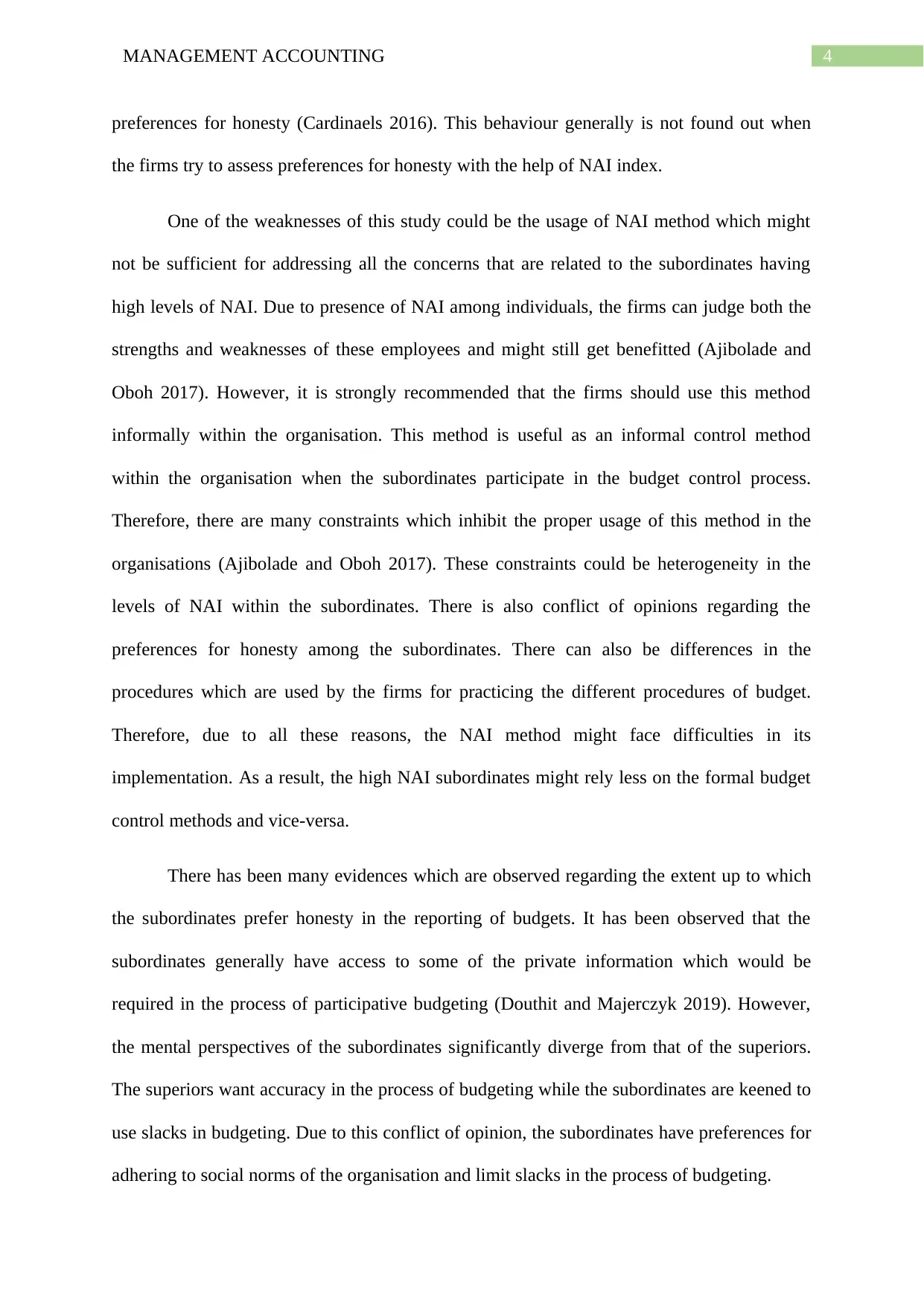
4MANAGEMENT ACCOUNTING
preferences for honesty (Cardinaels 2016). This behaviour generally is not found out when
the firms try to assess preferences for honesty with the help of NAI index.
One of the weaknesses of this study could be the usage of NAI method which might
not be sufficient for addressing all the concerns that are related to the subordinates having
high levels of NAI. Due to presence of NAI among individuals, the firms can judge both the
strengths and weaknesses of these employees and might still get benefitted (Ajibolade and
Oboh 2017). However, it is strongly recommended that the firms should use this method
informally within the organisation. This method is useful as an informal control method
within the organisation when the subordinates participate in the budget control process.
Therefore, there are many constraints which inhibit the proper usage of this method in the
organisations (Ajibolade and Oboh 2017). These constraints could be heterogeneity in the
levels of NAI within the subordinates. There is also conflict of opinions regarding the
preferences for honesty among the subordinates. There can also be differences in the
procedures which are used by the firms for practicing the different procedures of budget.
Therefore, due to all these reasons, the NAI method might face difficulties in its
implementation. As a result, the high NAI subordinates might rely less on the formal budget
control methods and vice-versa.
There has been many evidences which are observed regarding the extent up to which
the subordinates prefer honesty in the reporting of budgets. It has been observed that the
subordinates generally have access to some of the private information which would be
required in the process of participative budgeting (Douthit and Majerczyk 2019). However,
the mental perspectives of the subordinates significantly diverge from that of the superiors.
The superiors want accuracy in the process of budgeting while the subordinates are keened to
use slacks in budgeting. Due to this conflict of opinion, the subordinates have preferences for
adhering to social norms of the organisation and limit slacks in the process of budgeting.
preferences for honesty (Cardinaels 2016). This behaviour generally is not found out when
the firms try to assess preferences for honesty with the help of NAI index.
One of the weaknesses of this study could be the usage of NAI method which might
not be sufficient for addressing all the concerns that are related to the subordinates having
high levels of NAI. Due to presence of NAI among individuals, the firms can judge both the
strengths and weaknesses of these employees and might still get benefitted (Ajibolade and
Oboh 2017). However, it is strongly recommended that the firms should use this method
informally within the organisation. This method is useful as an informal control method
within the organisation when the subordinates participate in the budget control process.
Therefore, there are many constraints which inhibit the proper usage of this method in the
organisations (Ajibolade and Oboh 2017). These constraints could be heterogeneity in the
levels of NAI within the subordinates. There is also conflict of opinions regarding the
preferences for honesty among the subordinates. There can also be differences in the
procedures which are used by the firms for practicing the different procedures of budget.
Therefore, due to all these reasons, the NAI method might face difficulties in its
implementation. As a result, the high NAI subordinates might rely less on the formal budget
control methods and vice-versa.
There has been many evidences which are observed regarding the extent up to which
the subordinates prefer honesty in the reporting of budgets. It has been observed that the
subordinates generally have access to some of the private information which would be
required in the process of participative budgeting (Douthit and Majerczyk 2019). However,
the mental perspectives of the subordinates significantly diverge from that of the superiors.
The superiors want accuracy in the process of budgeting while the subordinates are keened to
use slacks in budgeting. Due to this conflict of opinion, the subordinates have preferences for
adhering to social norms of the organisation and limit slacks in the process of budgeting.
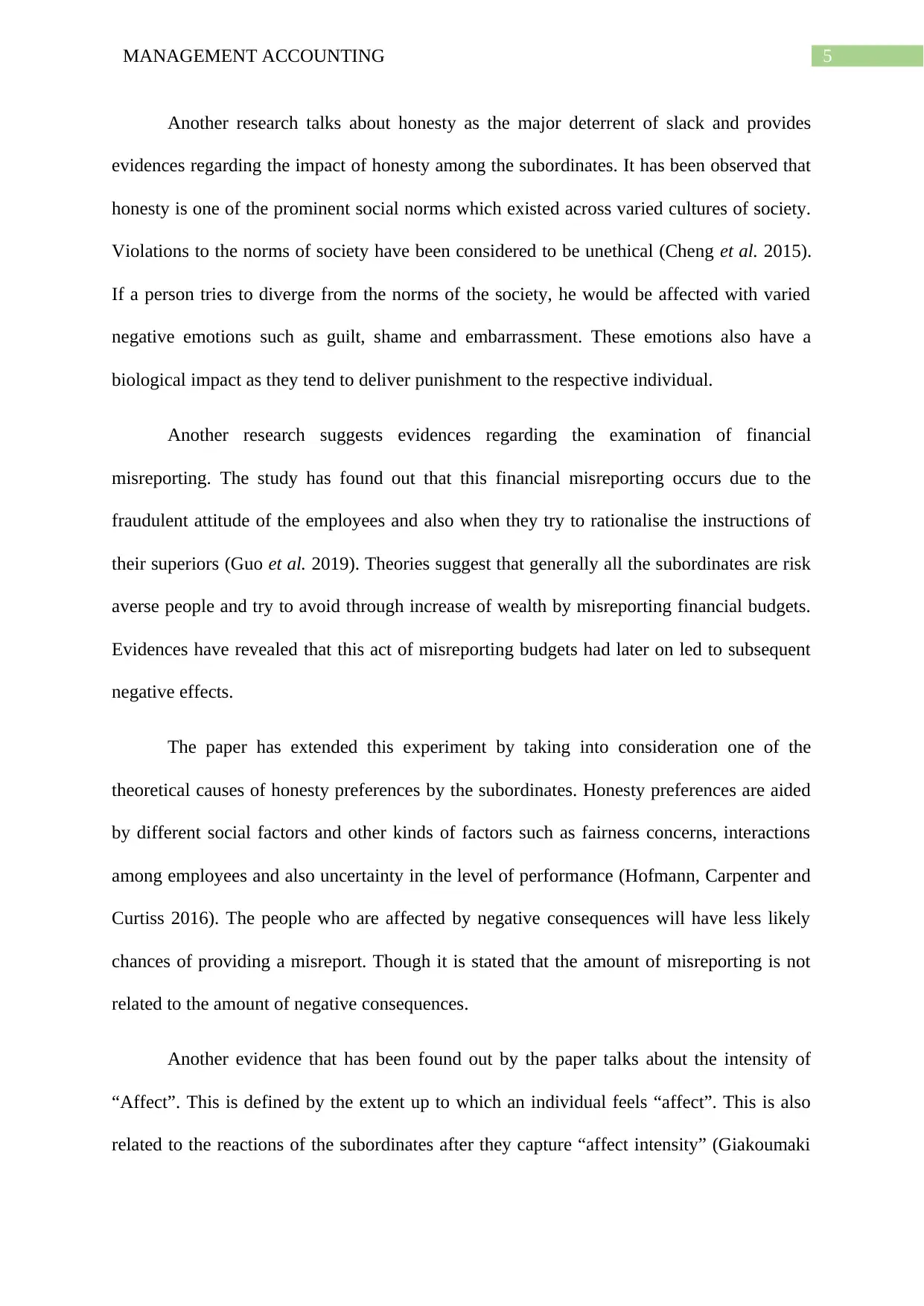
5MANAGEMENT ACCOUNTING
Another research talks about honesty as the major deterrent of slack and provides
evidences regarding the impact of honesty among the subordinates. It has been observed that
honesty is one of the prominent social norms which existed across varied cultures of society.
Violations to the norms of society have been considered to be unethical (Cheng et al. 2015).
If a person tries to diverge from the norms of the society, he would be affected with varied
negative emotions such as guilt, shame and embarrassment. These emotions also have a
biological impact as they tend to deliver punishment to the respective individual.
Another research suggests evidences regarding the examination of financial
misreporting. The study has found out that this financial misreporting occurs due to the
fraudulent attitude of the employees and also when they try to rationalise the instructions of
their superiors (Guo et al. 2019). Theories suggest that generally all the subordinates are risk
averse people and try to avoid through increase of wealth by misreporting financial budgets.
Evidences have revealed that this act of misreporting budgets had later on led to subsequent
negative effects.
The paper has extended this experiment by taking into consideration one of the
theoretical causes of honesty preferences by the subordinates. Honesty preferences are aided
by different social factors and other kinds of factors such as fairness concerns, interactions
among employees and also uncertainty in the level of performance (Hofmann, Carpenter and
Curtiss 2016). The people who are affected by negative consequences will have less likely
chances of providing a misreport. Though it is stated that the amount of misreporting is not
related to the amount of negative consequences.
Another evidence that has been found out by the paper talks about the intensity of
“Affect”. This is defined by the extent up to which an individual feels “affect”. This is also
related to the reactions of the subordinates after they capture “affect intensity” (Giakoumaki
Another research talks about honesty as the major deterrent of slack and provides
evidences regarding the impact of honesty among the subordinates. It has been observed that
honesty is one of the prominent social norms which existed across varied cultures of society.
Violations to the norms of society have been considered to be unethical (Cheng et al. 2015).
If a person tries to diverge from the norms of the society, he would be affected with varied
negative emotions such as guilt, shame and embarrassment. These emotions also have a
biological impact as they tend to deliver punishment to the respective individual.
Another research suggests evidences regarding the examination of financial
misreporting. The study has found out that this financial misreporting occurs due to the
fraudulent attitude of the employees and also when they try to rationalise the instructions of
their superiors (Guo et al. 2019). Theories suggest that generally all the subordinates are risk
averse people and try to avoid through increase of wealth by misreporting financial budgets.
Evidences have revealed that this act of misreporting budgets had later on led to subsequent
negative effects.
The paper has extended this experiment by taking into consideration one of the
theoretical causes of honesty preferences by the subordinates. Honesty preferences are aided
by different social factors and other kinds of factors such as fairness concerns, interactions
among employees and also uncertainty in the level of performance (Hofmann, Carpenter and
Curtiss 2016). The people who are affected by negative consequences will have less likely
chances of providing a misreport. Though it is stated that the amount of misreporting is not
related to the amount of negative consequences.
Another evidence that has been found out by the paper talks about the intensity of
“Affect”. This is defined by the extent up to which an individual feels “affect”. This is also
related to the reactions of the subordinates after they capture “affect intensity” (Giakoumaki
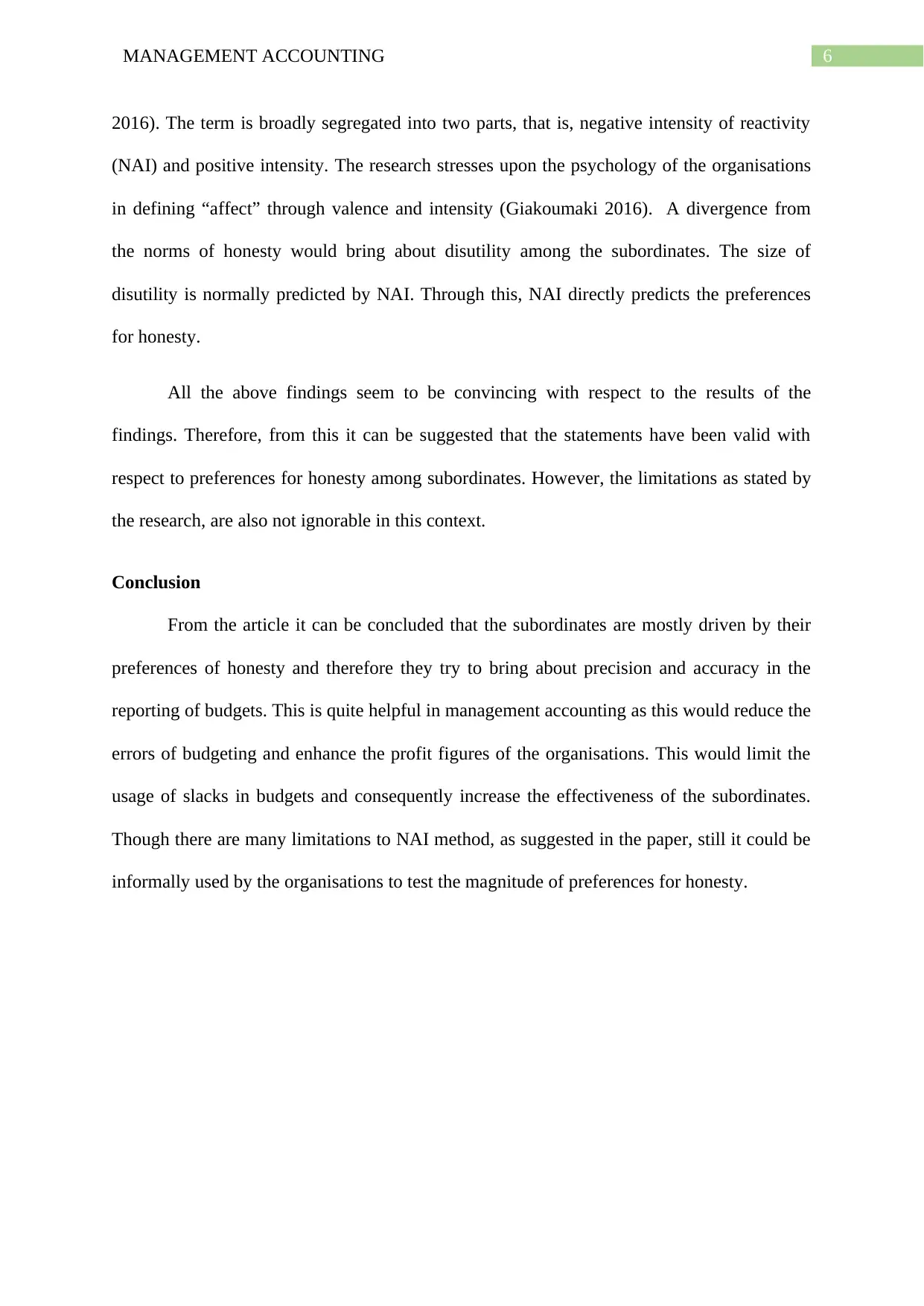
6MANAGEMENT ACCOUNTING
2016). The term is broadly segregated into two parts, that is, negative intensity of reactivity
(NAI) and positive intensity. The research stresses upon the psychology of the organisations
in defining “affect” through valence and intensity (Giakoumaki 2016). A divergence from
the norms of honesty would bring about disutility among the subordinates. The size of
disutility is normally predicted by NAI. Through this, NAI directly predicts the preferences
for honesty.
All the above findings seem to be convincing with respect to the results of the
findings. Therefore, from this it can be suggested that the statements have been valid with
respect to preferences for honesty among subordinates. However, the limitations as stated by
the research, are also not ignorable in this context.
Conclusion
From the article it can be concluded that the subordinates are mostly driven by their
preferences of honesty and therefore they try to bring about precision and accuracy in the
reporting of budgets. This is quite helpful in management accounting as this would reduce the
errors of budgeting and enhance the profit figures of the organisations. This would limit the
usage of slacks in budgets and consequently increase the effectiveness of the subordinates.
Though there are many limitations to NAI method, as suggested in the paper, still it could be
informally used by the organisations to test the magnitude of preferences for honesty.
2016). The term is broadly segregated into two parts, that is, negative intensity of reactivity
(NAI) and positive intensity. The research stresses upon the psychology of the organisations
in defining “affect” through valence and intensity (Giakoumaki 2016). A divergence from
the norms of honesty would bring about disutility among the subordinates. The size of
disutility is normally predicted by NAI. Through this, NAI directly predicts the preferences
for honesty.
All the above findings seem to be convincing with respect to the results of the
findings. Therefore, from this it can be suggested that the statements have been valid with
respect to preferences for honesty among subordinates. However, the limitations as stated by
the research, are also not ignorable in this context.
Conclusion
From the article it can be concluded that the subordinates are mostly driven by their
preferences of honesty and therefore they try to bring about precision and accuracy in the
reporting of budgets. This is quite helpful in management accounting as this would reduce the
errors of budgeting and enhance the profit figures of the organisations. This would limit the
usage of slacks in budgets and consequently increase the effectiveness of the subordinates.
Though there are many limitations to NAI method, as suggested in the paper, still it could be
informally used by the organisations to test the magnitude of preferences for honesty.
Paraphrase This Document
Need a fresh take? Get an instant paraphrase of this document with our AI Paraphraser
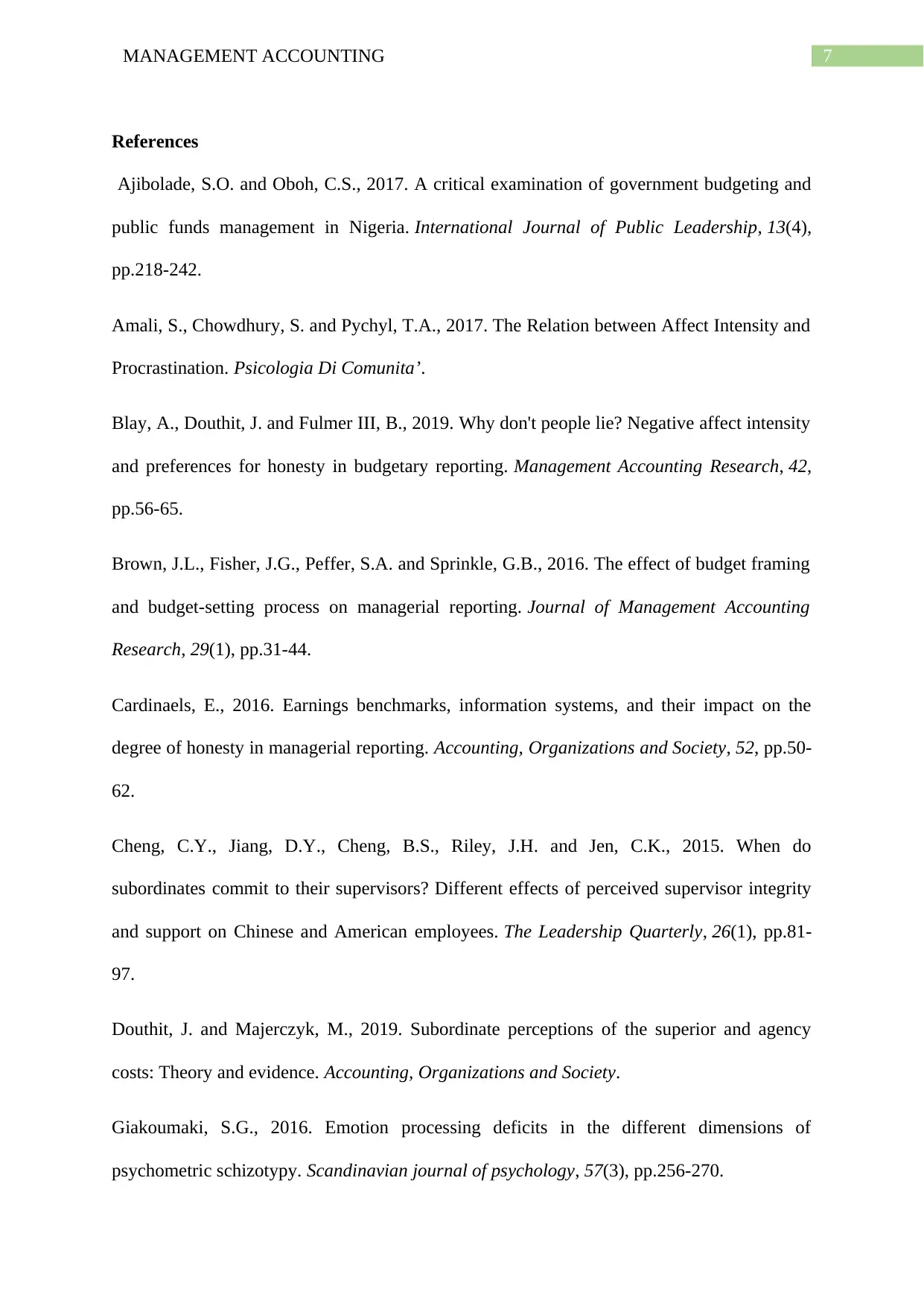
7MANAGEMENT ACCOUNTING
References
Ajibolade, S.O. and Oboh, C.S., 2017. A critical examination of government budgeting and
public funds management in Nigeria. International Journal of Public Leadership, 13(4),
pp.218-242.
Amali, S., Chowdhury, S. and Pychyl, T.A., 2017. The Relation between Affect Intensity and
Procrastination. Psicologia Di Comunita’.
Blay, A., Douthit, J. and Fulmer III, B., 2019. Why don't people lie? Negative affect intensity
and preferences for honesty in budgetary reporting. Management Accounting Research, 42,
pp.56-65.
Brown, J.L., Fisher, J.G., Peffer, S.A. and Sprinkle, G.B., 2016. The effect of budget framing
and budget-setting process on managerial reporting. Journal of Management Accounting
Research, 29(1), pp.31-44.
Cardinaels, E., 2016. Earnings benchmarks, information systems, and their impact on the
degree of honesty in managerial reporting. Accounting, Organizations and Society, 52, pp.50-
62.
Cheng, C.Y., Jiang, D.Y., Cheng, B.S., Riley, J.H. and Jen, C.K., 2015. When do
subordinates commit to their supervisors? Different effects of perceived supervisor integrity
and support on Chinese and American employees. The Leadership Quarterly, 26(1), pp.81-
97.
Douthit, J. and Majerczyk, M., 2019. Subordinate perceptions of the superior and agency
costs: Theory and evidence. Accounting, Organizations and Society.
Giakoumaki, S.G., 2016. Emotion processing deficits in the different dimensions of
psychometric schizotypy. Scandinavian journal of psychology, 57(3), pp.256-270.
References
Ajibolade, S.O. and Oboh, C.S., 2017. A critical examination of government budgeting and
public funds management in Nigeria. International Journal of Public Leadership, 13(4),
pp.218-242.
Amali, S., Chowdhury, S. and Pychyl, T.A., 2017. The Relation between Affect Intensity and
Procrastination. Psicologia Di Comunita’.
Blay, A., Douthit, J. and Fulmer III, B., 2019. Why don't people lie? Negative affect intensity
and preferences for honesty in budgetary reporting. Management Accounting Research, 42,
pp.56-65.
Brown, J.L., Fisher, J.G., Peffer, S.A. and Sprinkle, G.B., 2016. The effect of budget framing
and budget-setting process on managerial reporting. Journal of Management Accounting
Research, 29(1), pp.31-44.
Cardinaels, E., 2016. Earnings benchmarks, information systems, and their impact on the
degree of honesty in managerial reporting. Accounting, Organizations and Society, 52, pp.50-
62.
Cheng, C.Y., Jiang, D.Y., Cheng, B.S., Riley, J.H. and Jen, C.K., 2015. When do
subordinates commit to their supervisors? Different effects of perceived supervisor integrity
and support on Chinese and American employees. The Leadership Quarterly, 26(1), pp.81-
97.
Douthit, J. and Majerczyk, M., 2019. Subordinate perceptions of the superior and agency
costs: Theory and evidence. Accounting, Organizations and Society.
Giakoumaki, S.G., 2016. Emotion processing deficits in the different dimensions of
psychometric schizotypy. Scandinavian journal of psychology, 57(3), pp.256-270.
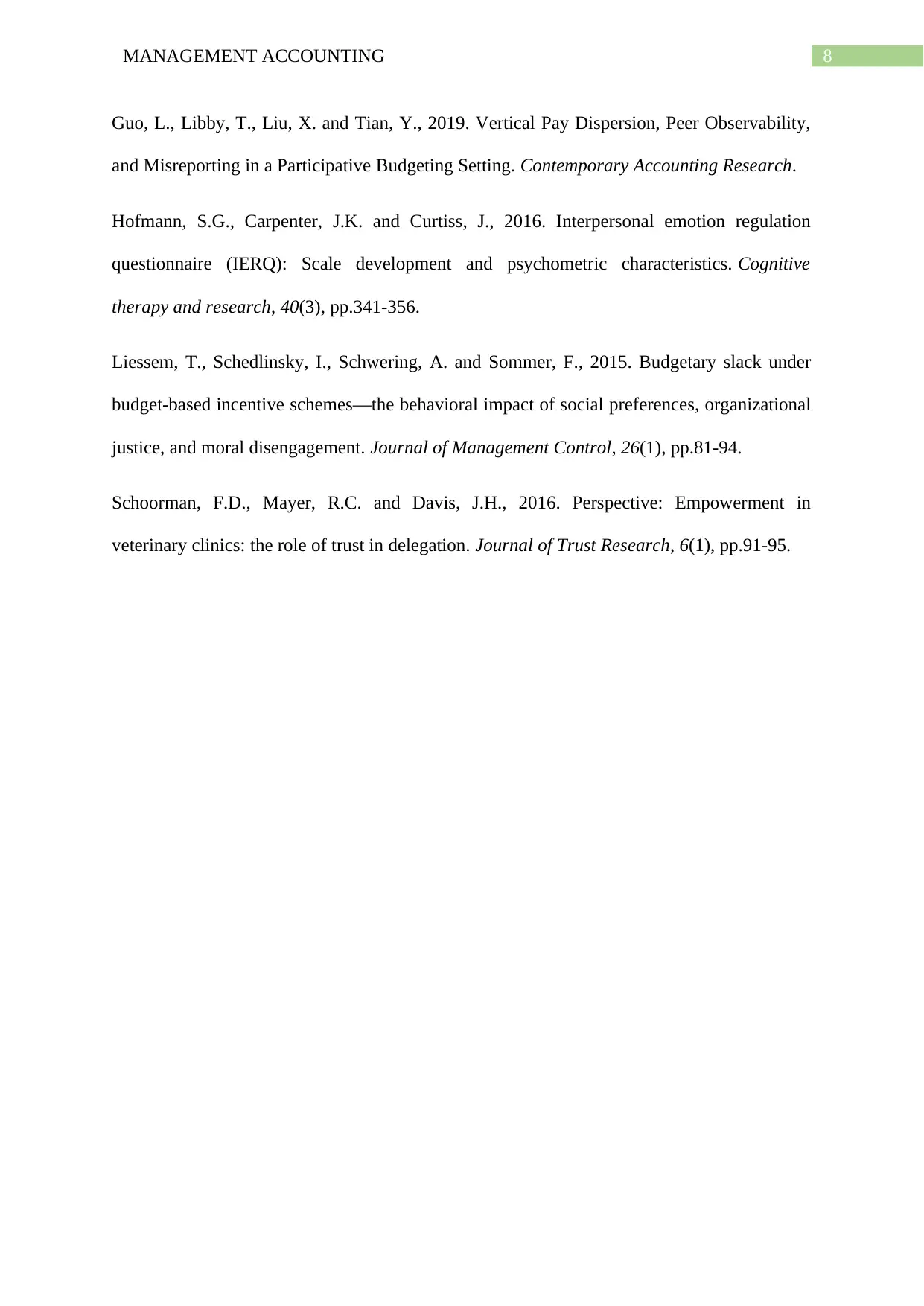
8MANAGEMENT ACCOUNTING
Guo, L., Libby, T., Liu, X. and Tian, Y., 2019. Vertical Pay Dispersion, Peer Observability,
and Misreporting in a Participative Budgeting Setting. Contemporary Accounting Research.
Hofmann, S.G., Carpenter, J.K. and Curtiss, J., 2016. Interpersonal emotion regulation
questionnaire (IERQ): Scale development and psychometric characteristics. Cognitive
therapy and research, 40(3), pp.341-356.
Liessem, T., Schedlinsky, I., Schwering, A. and Sommer, F., 2015. Budgetary slack under
budget-based incentive schemes—the behavioral impact of social preferences, organizational
justice, and moral disengagement. Journal of Management Control, 26(1), pp.81-94.
Schoorman, F.D., Mayer, R.C. and Davis, J.H., 2016. Perspective: Empowerment in
veterinary clinics: the role of trust in delegation. Journal of Trust Research, 6(1), pp.91-95.
Guo, L., Libby, T., Liu, X. and Tian, Y., 2019. Vertical Pay Dispersion, Peer Observability,
and Misreporting in a Participative Budgeting Setting. Contemporary Accounting Research.
Hofmann, S.G., Carpenter, J.K. and Curtiss, J., 2016. Interpersonal emotion regulation
questionnaire (IERQ): Scale development and psychometric characteristics. Cognitive
therapy and research, 40(3), pp.341-356.
Liessem, T., Schedlinsky, I., Schwering, A. and Sommer, F., 2015. Budgetary slack under
budget-based incentive schemes—the behavioral impact of social preferences, organizational
justice, and moral disengagement. Journal of Management Control, 26(1), pp.81-94.
Schoorman, F.D., Mayer, R.C. and Davis, J.H., 2016. Perspective: Empowerment in
veterinary clinics: the role of trust in delegation. Journal of Trust Research, 6(1), pp.91-95.
1 out of 9
Your All-in-One AI-Powered Toolkit for Academic Success.
+13062052269
info@desklib.com
Available 24*7 on WhatsApp / Email
![[object Object]](/_next/static/media/star-bottom.7253800d.svg)
Unlock your academic potential
© 2024 | Zucol Services PVT LTD | All rights reserved.

